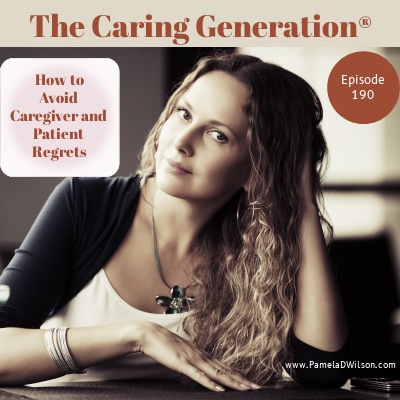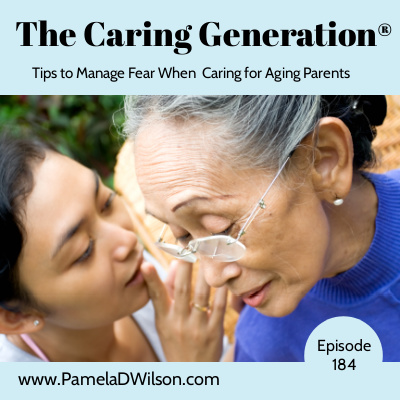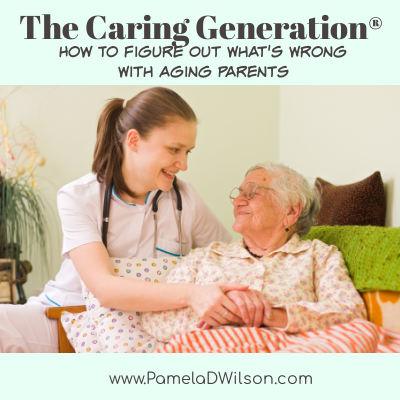Making Sure Elderly Parents Are Healthy

The Caring Generation® – Episode 146 July 27, 2022. Making sure elderly parents stay healthy can feel overwhelming when you’re not sure what is important. Caregiving expert Pamela D Wilson offers tips to support good health throughout life to help you and your loved ones stay healthy and live independently.
Have a question? Follow and connect with Pamela on her social media channels of Twitter, Linked In, Facebook, Instagram, and YouTube or complete the caregiver survey on her website.
To listen to the caregiving podcast, click on the round yellow play button below. To download the show so that you can listen anywhere and share it with family, friends, and groups, click on the button (the fourth black button from the left) below that looks like a down arrow. Click the heart to go to Pamela’s Spreaker podcast page to like and follow the show. You can also add the podcast app to your cellphone on Apple, Google, and other favorite podcast sites.
Making sure elderly parents remain healthy can feel like putting a puzzle together when you’re not sure what is important. Much of the advice you’re about to hear also applies to family caregivers, who may eventually be the persons who need care. While we often take good health for granted until something unexpected happens, being healthy must be a lifelong focus if we want to be active into our 60s and beyond.
How to Keep Elderly Parents Healthy and Living at Home
Watch More Videos About Caregiving and Aging on Pamela’s YouTube Channel
When you think of it, much of your life depends on the body you occupy and the things that occupy your time each day. What is your daily schedule? Do you get up and go to work? Do you take care of children at home? Do you work and have children in school? Are you retired?
Everything that you do requires using your body and mind. So what happens if you don’t feel well? You’re probably not as productive or active as you might be. Yet we often don’t think of life this way.
Taking the Body Forgranted
We assume that our body will do what we want it to do every day until we have a health issue that causes problems. Depending on how and where you were raised, there might not have been any education about eating healthy and the benefits of exercise. Because when we’re young, we don’t think about this unless our parents reinforce these behaviors
Or we may be fortunate to become knowledgeable about the importance of the steps it takes to remain healthy. So as caregivers interested in answers to for making sure elderly parents are healthy, there can be a lot to learn, including unhealthy habits to unlearn.
1 – Routine Vaccines
Let’s talk about number one, which is vaccines. Vaccines due to COVID have gotten more controversial. Yet when you think about it, as a parent you probably ensured that your children received all necessary vaccinations. When older it’s important for adult children to discuss vaccines for making sure elderly parents are healthy.
It’s easy to grow up and forget about keeping vaccinations up to date because of not going to the doctor every year for checkups and sometimes not at all unless sick. When we age, vaccinations become more critical because the body has aged and maybe chronic health issues like high blood pressure, diabetes, or other conditions increase susceptibility to viruses.
Research confirms vaccines are not as effective in elderly adults with many health conditions. For example, if you’ve followed COVID, you know that persons with diabetes or breathing problems are more susceptible. So if you or your aging parents are 60 years or older, what vaccines are important for making sure your elderly parents are healthy?
- Hepatitis B
- Shingles
- Pneumonia
- Annual flu vaccine
- TDAP (Tetanus, Diptheria, and Pertussis)
If you travel, there may also be other vaccines to consider. For some reason, we are all really good about getting our childhood vaccines, and then we go on with life and forget that we may need boosters for some of these vaccines throughout our lifetime.
2 – Dental Health
Number two for making sure elderly parents stay healthy is dental health. Now you might wonder, why is it so important to take care of your teeth?
Dental care goes both ways. (insert the link to the dental article) Chronic diseases like high blood pressure can raise the risk of gum disease, diabetes, arthritis, and kidney disease. Breathing problems like COPD and bronchitis can be linked to bacteria in the mouth.
If you smoke, smoking can negatively affect your teeth and the tissues in your mouth. Inflammation in the body from being overweight can result in gum disease.
Conversely, bacteria in the mouth from infected teeth or gums can be inhaled into the lungs. Inhaling bacteria frequently happens in the elderly, who then succumb to respiratory infections, pneumonia, or bronchitis.
Bacterial infections in the mouth can also cause sepsis, a very serious infection in the blood that can be life-threatening. So regular dental care is another step in making sure elderly parents stay healthy.
The importance of regular dental checkups and teeth cleaning
For all these reasons, seeing the dentist every six months for a checkup and getting your teeth cleaned is very important. Admittedly if you don’t have good dental insurance or insurance at all, this is something that you should budget and plan for.
You only have one set of teeth. Taking care of teeth and gums by brushing and flossing twice daily can help avoid cavities and gum infections.
I don’t know anyone who likes to go to the dentist—me included. I learned the hard way on my own. When I was young, my parents weren’t good about making me brush my teeth, so at a young age, maybe 10 or 12, I had a mouth full of cavities. Since then, I have been very proactive in taking care of my teeth to avoid more cavities.
So for elderly parents or anyone, how do you know if you have a dental infection or a bad tooth?
Any sensitivity to hot or cold can indicate a tooth is going bad. Obviously, pain or any swelling in the mouth, especially when biting down. Constant bad breath can also mean a gum or tooth infection. The best advice is to see a dentist every six months to prevent potential issues.
3 – Bone Health
Number three for making sure elderly parents stay healthy is monitoring bone health. Elderly adults who experience falls or fractures have a more challenging time managing physically after an injury.
For example, aging parents may not be able to walk as well after fracturing a hip or may have problems using an arm if a fracture or shoulder problem occurs. Shoulder injuries take time to heal and if physical therapy is not completed can result in the loss of shoulder mobility.
Challenges in performing everyday activities can snowball into many other health issues. Let’s say that your mom or dad was physically active, but now they don’t get around as well because of a fall. Parents may start limiting their activity because of pain or because they are afraid of having another fall.
One injury can snowball into other health problems
What happens when you stop using the body or lose confidence to perform daily self-care activities? The body becomes weaker. Making sure elderly parents are healthy requires caregivers to reinforce the importance of regular physical activity.
Parents begin sitting all day when they were previously active when the body becomes more fragile. Then one health concern will cause another. So, for example, heart disease results in diabetes, kidney issues, and so on.
After age 50, getting a bone density exam can tell you or your aging parents if your bones are strong or weak. If weak, talking calcium daily and participating in weight-bearing exercises like walking is the solution.
Staying healthy and physically able helps older adults remain independent and live at home. If remaining self-sufficient and independent is your goal, you must schedule time daily to work on your health and physical activity. This isn’t optional.
If you have elderly parents with many health issues, you likely see the challenges in their daily life. Parents may have problems walking, standing from chairs, getting in and out of a car, or walking through a grocery store. They may get tired from standing. All these issues are preventable when caregivers offer support for making sure elderly parents are healthy.
Looking for a Checklist for Caring for Elderly Parents? Listen to The Caring Generation podcast Episode 8.
4 – Maintaining Muscle Mass and Physical Strength

Beginning between 30 and 40, unless you make an activity plan, the body starts losing muscle mass and physical strength. The combination of these issues translates to being diagnosed with health concerns, doing less physically, or becoming tired more easily.
You’ve seen the signs as your elderly parents become weaker and have heard the motto “use it or lose it.” Making sure elderly parents are healthy can be accomplished by helping mom or dad create a weekly activity schedule.
Weakness is the path the body takes unless parents make a plan. Making time for a combination of cardio activities like walking, running, cycling, going to the gym, and working out on cardio machines, plus using weights to maintain strength, makes a big difference in energy and endurance to do the activities you want.
Daily exercise results in feeling better and having more energy. Exercise is good for the mind and body. Being physically active can also prevent many health issues that begin to crop up in middle age.
5 – Attending Regular Medical Appointments
Another step for making sure elderly parents are healthy is seeing the doctor for an annual checkup and bloodwork. Many health conditions like high blood pressure and diabetes are not always noticeable.
You might have serious health issues and think that you are in excellent physical condition but be surprised to learn by bloodwork drawn that you have diabetes and high cholesterol or high triglycerides. Unfortunately, these health conditions sneak up on many people who lack education about the importance of seeing a doctor every year.
If you feel healthy, you or your elderly parents might think it’s a hassle and an expense to see the doctor. Whether you are a family caregiver or a middle-aged adult, you give yourself the gift of time and prevention by visiting the doctor.
If you discover health issues when you are young and the health issues are early, you may be able to reverse the health condition by changing your exercise habits or diet. You get to choose.
If you wait and are not proactive about your health, don’t go for annual checkups or bloodwork, and then become sick and have to go to the doctor, you may have missed the opportunity to reverse a health condition that you may now be stuck managing.
This isn’t the end of the world. There is still a lot that can be done if you choose to be proactive. Making sure elderly parents are healthy means being realistic about health concerns and taking preventative actions to stop them from worsening.
Being proactive at medical appointments
Let’s talk about attending doctor appointments. Medical appointments are not one-way appointments.
Making sure elderly parents are healthy means making sure your parents are comfortable asking questions. Many older adults don’t ask questions because they feel doctors are in a position of power.
If the doctor gives you information and you don’t understand—speak up. If the doctor talks about your bloodwork readings, ask questions.
- What does the number mean?
- How serious is this?
- How can I decrease high cholesterol or triglycerides, or blood sugar?
You control your body, it’s yours, and you have to live in it for a very long time—until the end of your life. If you don’t feel well or can’t do the things you did six months or five years ago—that’s a problem.
If the doctor prescribes a medication, ask why. Ask about the long-term effects of taking the medication. Ask about the side effects.
You can never ask too many questions about your health because this is the only way to learn. Making sure elderly parents are healthy means educating them about the importance of becoming their own advocates.
Advocating with doctors and healthcare providers
If you are hesitant to ask questions or have a language barrier, take someone with you to the appointment who can help you ask questions. The reality is that you know your body better than anyone else.
You must be honest with the doctor about your daily habits and activities because the doctor uses this information to diagnose and help you. Making sure elderly parents are healthy means not hiding information from the doctor due to embarrassment.
Many older adults with health issues get dressed up and want to make a good impression at medical appointments. This behavior is contradictory to the importance of being honest about health issues to get needed treatment.
The relationship you create with your doctor is significant to how you feel and the care you receive. Unfortunately, too many patients don’t participate or ask questions and then have more health problems and wonder why.
Making sure elderly parents are healthy means being active in caring for the body and health. I know this may not be behavior that parents modeled when you were young. You may have to learn this on your own. It’s okay. You can do it.
Understanding the risks and benefits of hospitalization
The same goes for having an elderly parent hospitalized. It can be hard to imagine the day-to-day experience if you’ve never been hospitalized. Making sure elderly parents are healthy means learning what happens during a routine hospital stay.
Let me paint a picture of being hospitalized. Mom or dad get sick and go to the hospital emergency room. They are admitted for a health concern.
Immediately blood tests and other X-rays, CT scans, or MRIs might be run to diagnose the issue. Mom or dad might be given IV medicines. Then the doctors might order medications or injections.
This is the time to ask what you—If you are the person hospitalized—are prescribed and why. Asking these questions for an elderly parent is critical to making sure elderly parents are healthy.
Here’s the reality. Doctors write orders. Nurses in the hospital follow the orders. So, medication orders or injections may cause unintended problems unless you ask questions.
Using knowledge to ask questions and advocate
While you may want to believe that the doctor knows best, you know your medical history the best. Something prescribed may not agree with you and make you feel worse. Maybe you’ve had an allergic reaction in the past.
Here’s one example. What if heparin injections are ordered by the doctor? Why might this injection be needed or not?
Heparin is used to prevent blood clots from forming in people with certain medical conditions or undergoing procedures that increase the chance that blood clots will form. This injection thins the blood. Heparin injections have a lot of side effects and can cause bruising.
If you or your aging parent are relatively healthy, even though the doctor may write an order for heparin injections, the injection may not be necessary or beneficial. Each medical decision you make can be reviewed individually.
Medical treatments have side effects and unexpected consequences
Each medication prescribed can cause side effects that may require another prescription drug to solve. Having chronic health issues and taking many medicines is a slippery slope that may make parents feel worse instead of better.
I’m not saying that doctors don’t know what they’re doing, but they order many routine things when patients are hospitalized. Knowing that you have the right to ask questions and to say no is critical to making sure elderly parents are healthy.
Hospitalized patients are sleep deprived
Add to these considerations the fact that hospitalized persons are sleep deprived. Now you might think the hospital is the place to go and get some rest. Not true.
The nurses are ordered to take vital signs every four hours around the clock. This means that if you are a hospitalized patient, you don’t get to sleep through the night or even the day.
Additionally, if you are on IV fluids or antibiotics, these may have to be changed frequently in addition to being checked for vitals. So you or your elderly parent in the hospital may only get bits of sleep here and there. Sleep is critical for making sure elderly parents are healthy.
So while being hospitalized is the best scenario to treat urgent and life-threatening conditions, it’s not a comfortable place to be for anyone. And if your parents can’t ask questions and advocate for themselves, family caregivers must show up to ask all the questions
Post hospitalization weakness
Making sure elderly parents are healthy means that you may need to pay more attention to mom or dad after they are hospitalized if they’ve been lying in bed for any time. For older adults who are physically weak and have health issues, time in bed can result in more physical weakness.
So a parent who was hospitalized may return home more tired due to sleep deprivation while in the hospital. Mom or dad may be physically weaker than when they went into the hospital if they weren’t in top physical condition before the hospitalization.
So there will be a bit of work and a commitment from mom or dad to exercise and regain their physical strength if they want to improve. Hospital stays emphasize the importance of being as healthy as possible throughout your life.
You never know when you might be in a car accident or have an unexpected health concern that throws a curve ball into your daily schedule. Unexpected events happen even to the healthiest of individuals.
Maintaining consistent health habits
You can prepare for unforeseen health issues by being as healthy and strong as you can possibly be every day of your life. Being physically fit and strong takes time, attention, and consistency.
It’s easy to get lazy and say, well, I don’t feel like exercising today. But, you’ve got to motivate and push yourself if you want to be healthy in middle age and later. There’s no other option. The earlier you recognize this, the earlier you can take action for yourself and make sure elderly parents are healthy.
6 – Monitor Social Activity, Mental & Cognitive Health
Number six for making sure elderly parents are healthy is to monitor social activity and mental and cognitive health. All three of these go together.
As a caregiver, you might even notice this for yourself. You feel and do better when you spend time with friends and are active. Your mood is better. You’re more positive, and you enjoy interesting conversations.
Social isolation can result in mood and depression concerns which over time can have a negative effect on memory for the elderly. Making sure elderly parents are healthy means finding ways to support their interactions with others.
Whether investigating senior center activities and hobbies or making it easy for elderly parents to see their friends, efforts in this area will reap health benefits. Research confirms that people who are socially active are healthier and live longer.
Family caregivers who become socially isolated, feel alone, or depressed are more likely to experience health issues. So the activities and recommendations you make to your elderly parents also apply to your own life.
Everything we’re talking about here today is suitable for persons of all ages. There’s no sugar coating it that being healthy takes work. You have to commit.
Encouraging Elderly Parents Can Be Frustrating When They Refuse Help. For Tips Listen to The Caring Generation Podcast Episode 12 Dealing With Negative Elderly Parents.
7 – Noticing Changes in Health Conditions
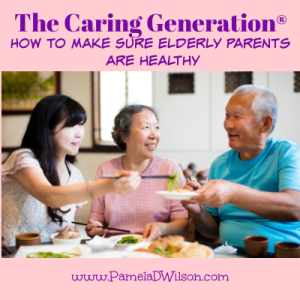 Number seven for making sure elderly parents are healthy is noticing changes in condition. Now change in condition is a term used by healthcare providers. What does it mean?
Number seven for making sure elderly parents are healthy is noticing changes in condition. Now change in condition is a term used by healthcare providers. What does it mean?
It means that caregivers must be able to notice even the most minor changes in health or activity of an elderly parent because these small changes can be the beginning of a health concern that turns out to be a significant issue.
For example, not having an appetite for a day or two, having a fever or a cough, or not wanting to get out of bed.
These changes in health might indicate pneumonia, a stomach issue, or something else. When these changes happen, make a doctor appointment as soon as possible or if the change is severe, take a parent to an emergency care location or to the hospital.
For the elderly, paying attention to these small changes can mean that the caregiver identifies an issue early and avoids hospitalization. As we discussed, hospitalizations are risky, especially for older adults. If you can have a parent treated and avoid hospitalization, that is the goal.
8 – Managing Multiple Chronic Conditions
If you are already a caregiver, it’s probably likely that your parent has several health issues that you are managing. To be proactive, attending medical appointments with your parents is essential to learn about all the diagnoses, the short and long-term effects, what medications are prescribed, and for what reasons.
When you become an advocate and are proactive, the health of your elderly parents will become more manageable. You can avoid unexpected situations or at least know how to manage them better.
Making sure elderly parents are healthy means getting to know your parent’s doctors and becoming comfortable asking questions and presenting facts about your parent’s health. You’ll become familiar with their medications and probably even get to know the staff at the pharmacy.
Managing the health conditions of aging parents is excellent education that can help caregivers learn how to take better care of their health. You’ll learn advocacy skills you never knew existed.
Taking Care of Yourself Is Important While You’re Caring for Others. Learn Survival Skills for Caregivers on The Caring Generation Podcast Episode 18.
9 – Regular Health Screenings
So like we talked about earlier, with vaccines that should be investigated for persons over age 60, there are screenings that benefit everyone. Examples include colonoscopy, bloodwork testing for cholesterol, triglycerides, high blood sugar, bone density, well women exams, mammograms, hearing and vision testing, dental appointments, and more.
In addition, if your parents have certain medical conditions, additional screenings may be beneficial. So, for example, a CT scan to monitor spots on the liver or lungs and so on.
Keeping up with all of this may have you feeling like you have regular monthly visits to doctors or specialists. This becomes more common with age.
But if you keep up with all of these, you can avoid so many unexpected issues because you can discuss preventative actions with your elderly parents and the doctor.
End-of-life hospice care
Now there may come a time when a parent says, “no more.” I’m done with all of these treatments and medical appointments. This is a valid expression. It’s the right of any person to say “no more.”
Especially if the treatments aren’t providing any quality of life or the person is in a lot of pain or suffering. In this case, it may be time to investigate hospice care, also known as comfort care, instead of extensive treatments.
Making sure elderly parents are healthy also means knowing when continuing to push preventative measures no longer makes any sense. Many caregivers unknowingly prolong the lives of loved ones by continuing care that no longer has a significant benefit.
Deciding against treatments that no longer have value
We’re all going to come to a time of life when the body has had enough and starts to shut down. That may happen for some people in their 60s if they have a cancer diagnosis and go through chemotherapy and radiation. For some, it may not occur well into their 90s if they were attentive to their health all their lives.
However, regardless, hospice care, if managed well by the family, can be a blessing. I know many caregivers who engage in hospice for loved ones who are dissatisfied with the level of care and assistance provided.
Like everything else, we discussed that it’s up to you to manage the hospice provider while making needs known. Hospice providers get paid a daily benefit for doing nothing or doing something.
Family caregivers must be advocates in all healthcare situations
Similar to working with doctors and hospital providers, family caregivers must speak up for elderly parents and their needs. If you don’t feel you are getting the support you want, fire a hospice company and choose another. But before you do this, ask for a meeting with the hospice and medical directors if necessary.
This is your right as a family member. You may be able to work out a system where your loved ones will receive better care, and you will get the support you need as a caregiver. Making sure elderly parents are healthy means knowing how to advocate for pain and symptom management at the end of life.
Many hospice companies offer grief counseling. Don’t feel that you have to accept counseling if you’re not in an emotional place where you think it will be beneficial.
I have known caregivers who felt that the chaplain or other hospice workers wanted them to reconcile years of issues that were not going to be solved in a few short sessions. As a result, the caregiver felt more emotionally stressed by hospice attempts to intervene.
As with all things health-related, your involvement and knowledge of the situation are critical. Just as you get out of life the effort, you put in, the same goes for your health and the health of loved ones if you are lucky enough to learn about preventative health measures as early as possible in life.
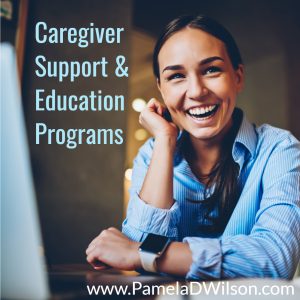
Never give up pursuing your goals, whatever they are. Don’t wait or put yourself in a position where it’s a year from now, and you’re looking back saying, I wish I would have started then to take better care of my health. Thanks for joining me.
Looking For Help Caring for Elderly Parents? Find the Information Including Step-by-Step Processes in Pamela’s Online Program.
©2022 Pamela D. Wilson All Rights Reserved

